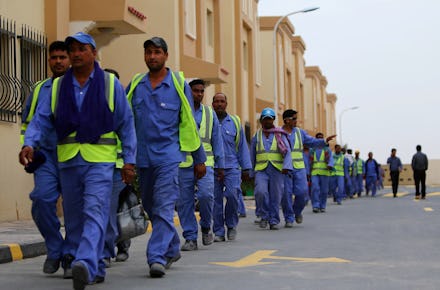One Chart Shows the Awful Human Toll the 2022 Qatar World Cup Is Already Taking

Since FIFA announced the 2022 World Cup would be hosted in Qatar, there have been a number of criticisms leveled at the choice of location, from the dangerously hot summers to allegations of human rights abuses.
The biggest problem, though, has been the human toll in sheer body count. Since construction on World Cup infrastructure began in 2010, hundreds of workers have died in the process. While deaths have unfortunately become a part of the construction for these international events, as this recently published Washington Post chart shows, the comparison is astronomical.
The Washington Post notes these numbers are not perfectly accurate, as they reflect the total number of migrant deaths since Qatar won the bid to host in 2010 and because other countries' numbers are a mix of official and unofficial estimates, but they still offer insight into the human cost of hosting the games. The International Trade Union Confederation estimates 1,200 workers have died since Qatar won its bid in 2010.
The country was known for its abuses of migrant workers before being awarded the 2022 World Cup, but the problem has intensified since then.
The chart is the tip of the iceberg. Treatment of migrants, who constitute 90% of the country's population, according to the New York Times, is abysmal. Workers are basically powerless and are routinely denied water and forced to live in squalor. In 2014, roughly one worker died every day, as per a report by the Guardian. It's estimated up to 4,000 could die before the project is done.
Human Rights Watch published a profile on Qatar in their 2014 World Report, examining the slave-like conditions under which migrant laborers are expected to work. Kafala, their sponsorship system, binds the worker's legal status in the country to their employers, who often seize passports upon arrival, withhold wages and prohibit their employees from changing jobs or leaving Qatar.
However, despite international scrutiny, this system of enslavement continues.
Will it stop? Even before Wednesday's indictments of 14 officials on corruption charges, there were rumors that FIFA awarded Qatar the games because of bribery. So, it's unlikely that pressure to improve working conditions will come from the soccer association. In May 2014, in response to international pressure, Qatar reportedly vowed to change the migrant workers' laws and make conditions more humane, but such changes have yet to be made.
The future of the game looks uncertain, but it's not likely Qatar's invitation to host will be rescinded.
June 3, 2015, 10:48 a.m.: This article has been updated.